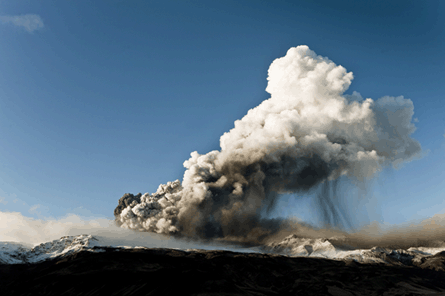Aviation will probably fare better the next time volcanic ash invades Europe's skies, providing that the European Aviation Safety Agency is enabled to co-ordinate an EU-wide response to the situation.
That was one of the expert opinions delivered during a moderated discussion on Europe's volcanic ash response at the Civil Air Navigation Services Organisation Global Air Traffic Management Forum in Oslo on 14 June.
Europe's uncoordinated aviation response to the ash cloud was caused by its nationally fragmented air traffic management systems, combined with a complete absence of published scientific data on what levels of ash concentration were safe for aircraft to operate in, according to Eurocontrol director general David McMillan.
 |
|---|
© IBL/Rex Features |
The Irish Aviation Authority's chief executive Eamonn Brennan also noted the lack of leadership from EASA, suggesting agency leadership would be a key factor in a future response.
McMillan argued that the lack of ash-tolerance data for engines and airframes available to ATM providers and airlines gave the aviation authorities no choice but to recommend grounding until the ash dispersed or safe levels were scientifically identified.
Doug Johnson of the London Volcanic Ash Advisory Centre (VAAC) presented the CANSO gathering with a summary of the centre's capabilities for ash cloud monitoring and modelling.
At the time of the Icelandic eruptions the London VAAC's ash cloud detection, tracking and modelling system proved accurate when compared with all other global capabilities, he said.
In a future event the VAAC would be able to provide daily actual and predictive charts based on the new ash concentration zoning system thrashed out during the recent crisis, which would mean access for the airlines to more airspace.
Continuing the discussion, the International Air Transport Association's Jeff Poole accused European agencies of "staggering complacency" when the ash cloud arrived, with no response available during the first weekend.
Poole voiced the hope that the huge losses to the European economy caused by the grounding may wake politicians up to the importance of aviation and its essential infrastructure.
Ásgeir Pálsson, head of Icelandic ATM provider Isavia called for validation of the parameters for ash-damage tolerance to airframes and engines, and fired a shot at airline claims by suggesting that "random test flights achieve nothing".
Dieter Kaden of German ATM provider DFS pointed out that engine manufacturers were still not providing the support that might be expected, and that warranties and insurance for engines were still being removed by manufacturers from aircraft flying close to ash.
Source: Flight International























